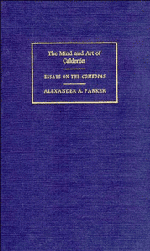Book contents
- Frontmatter
- Contents
- Author's preface
- Editor's preface
- Introduction
- I Stylistic and dramatic craftsmanship
- II From experience to myth
- III The tensions of social life
- 11 The functions of comedy
- 12 The vicissitudes of secrecy (1): La dama duende, El galán fantasma
- 13 The vicissitudes of secrecy (2): El astrólogo fingido
- 14 Secret betrothals and secret marriages: El postrer duelo de España
- 15 From comedy to tragedy: No hay cosa como callar
- 16 A Calderonian conception of tragedy: El pintor de su deshonra
- 17 The tragedy of honour: El médico de su honra
- IV The tensions of public life
- V From symbol to myth
- Epilogue
- Notes
- Index
16 - A Calderonian conception of tragedy: El pintor de su deshonra
Published online by Cambridge University Press: 05 February 2012
- Frontmatter
- Contents
- Author's preface
- Editor's preface
- Introduction
- I Stylistic and dramatic craftsmanship
- II From experience to myth
- III The tensions of social life
- 11 The functions of comedy
- 12 The vicissitudes of secrecy (1): La dama duende, El galán fantasma
- 13 The vicissitudes of secrecy (2): El astrólogo fingido
- 14 Secret betrothals and secret marriages: El postrer duelo de España
- 15 From comedy to tragedy: No hay cosa como callar
- 16 A Calderonian conception of tragedy: El pintor de su deshonra
- 17 The tragedy of honour: El médico de su honra
- IV The tensions of public life
- V From symbol to myth
- Epilogue
- Notes
- Index
Summary
It used to be considered that Spain had made no original or significant contribution to tragic drama. This was often explicitly stated in general histories of the European theatre, or in studies of tragedy in particular. Hispanists did little to dispel this belief because many of them shared it themselves. As regards the seventeenth century, an explanation for the inability to write tragedy was usually looked for in the religious spirit of the times. No student of Spanish literature need be reminded how horror of the Spanish Inquisition covered every sphere of Spanish history and culture, as an ominously oppressive shadow over everything, even when its activities were not in question. Liberal-minded Spaniards turned against their own history and culture as decisively as did foreigners. Today nobody looks to history to exemplify the dominance of enlightenment in human affairs. For the most part literary historians and critics no longer find in what they study what their general prejudices tell them must surely exist. But some Spaniards went even further than this and ascribed their alleged inability to feel a sense of tragedy to their national temperament, to a supposed contempt for pity, for example. A priori assumptions are not the way in which history and culture are now approached. Calderón and his century can now be approached without prejudices, leaving the mind of the critic free to see what his art does in fact offer when properly understood.
- Type
- Chapter
- Information
- The Mind and Art of CalderónEssays on the Comedias, pp. 196 - 212Publisher: Cambridge University PressPrint publication year: 1989



